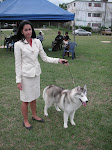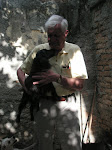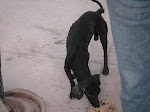Nora and Friends
Rehoming
It always surprises me how much interest there is among
tourists visiting Cuba in helping out the stray animals they encounter. Many are eager to adopt a dog they've seen
and ship him home, wherever that may be.
We try to be careful in enabling these projects as the
adopter needs to be realistic about how long it can take and how much it might
cost. Even faced with the costs, many
still want to adopt a Cuban dog and ship him home.
A couple of years back we learned of the rigorous
requirements the UE imposes on importing dogs.
They are so tough, it is nearly impossible to accomplish rehoming in the
UE. I was corresponding with Nora
Garcia, Aniplant's President, when I received her comments on rehoming, and I
felt they were worth sharing with you.
As you'll see, not all of these projects end up with a dog as well
adapted as Pablo is. (Pablo is the rehomed dog pictured below romping on the
beach at Malibu.) Nora's words show the
loving spirit that prompts Aniplant's work for the animals of Cuba. Nora wrote:
We have sent 2 animals
to Germany—a dog and a cat, and I have photos of thanks from those
persons. Also we've sent to Canada and
several to the US. (The US count is 14
counting Pablo and Christian,) Two dogs,
brothers, went to Spain. The UE
regulations are tough but achievable when there is true interest on the other
side and they really want the animal.
One American official shipped 8 dogs at one time—a really memorable
event.
I believe I told you
of two young people visiting in Trinidad, Cuba who found and picked up a little
dog with malformed feet, saved him, and wanted to take him with them..They had
true interest because when they got to the tourist bus to return, the driver
wouldn't let them board the bus with the dog.
So they rented a car and arrived here in Havana with him.
They asked us for
shelter, and I got the husband of an Aniplant employee to promise to care for
him. We supplied his food and we paid 90
CUC (about $90) for three months fostering, grooming, vaccinating, and a blood
test. When the paid time was used up and
the dog was healthy and we were ready to send the blood sample, the young men
wrote us and said that they had no money to pay for all that was needed. I needed to tell the foster parent what had
happened. I thought he would keep the
dog out of love for him. When I told
him, he told me definitely if we didn't have the money, we couldn't have the
dog.
We were faced with the
impossibility of placing an adult dog with twisted feet whom we all
adored. I offered the foster parent half
of what was owed, and he accepted, and ever since then we've paid 360 pesos in
his expenses and supplied his food.
These are the risks of taking a dog for eventual shipping. The only pay we get is to know the dog is
happy. In this case, the foster parents
don't mistreat him, and he is very loving to them. They care well for him. The foster parent is on a fixed salary, and
what we pay for the dog's care is a big help to them.
We have setbacks, but
we keep going forward, after 27 years, in this business, Aniplant has a long
history with many stories to tell.
Nora
































































































